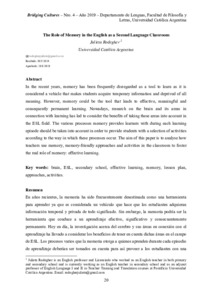Por favor, use este identificador para citar o enlazar este ítem:
https://repositorio.uca.edu.ar/handle/123456789/9535| Campo DC | Valor | Lengua/Idioma |
|---|---|---|
| dc.contributor.author | Rodegher, Julieta | es |
| dc.date.accessioned | 2020-03-11T13:31:26Z | - |
| dc.date.available | 2020-03-11T13:31:26Z | - |
| dc.date.issued | 2019 | - |
| dc.identifier.citation | Rodegher, J. The role of memory in the english as a second language classroom [en línea]. Bridging Cultures. 2019, 4 (4). Disponible en: https://repositorio.uca.edu.ar/handle/123456789/9535 | es |
| dc.identifier.issn | 2525-1791 | - |
| dc.identifier.uri | https://repositorio.uca.edu.ar/handle/123456789/9535 | - |
| dc.description.abstract | Abstract: In the recent years, memory has been frequently disregarded as a tool to learn as it is considered a vehicle that makes students acquire temporary information and deprived of all meaning. However, memory could be the tool that leads to effective, meaningful and consequently permanent learning. Nowadays, research on the brain and its areas in connection with learning has led to consider the benefits of taking these areas into account in the ESL field. The various processes memory provides learners with during each learning episode should be taken into account in order to provide students with a selection of activities according to the way in which these processes occur. The aim of this paper is to analyse how teachers use memory, memory-friendly approaches and activities in the classroom to foster the real role of memory: effective learning. | es |
| dc.description.abstract | Resumen: En años recientes, la memoria ha sido frecuentemente desestimada como una herramienta para aprender ya que es considerada un vehículo que hace que los estudiantes adquieran información temporal y privada de todo significado. Sin embargo, la memoria podría ser la herramienta que conduce a un aprendizaje efectivo, significativo y consecuentemente permanente. Hoy en día, la investigación acerca del cerebro y sus áreas en conexión con el aprendizaje ha llevado a considerar los beneficios de tener en cuenta dichas áreas en el campo de ESL. Los procesos varios que la memoria otorga a quienes aprenden durante cada episodio de aprendizaje deberían ser tomados en cuenta para así proveer a los estudiantes con una selección de actividades acorde a la forma en la cual estos procesos ocurren. El objetivo de este trabajo es analizar cómo los maestros usan la memoria, los enfoques y las actividades afines en la clase para promover el verdadero rol de la memoria: el aprendizaje efectivo. | es |
| dc.format | application/pdf | es |
| dc.language.iso | eng | es |
| dc.publisher | Universidad Católica Argentina. Facultad de Filosofía y Letras. Departamento de Lenguas | es |
| dc.rights | Acceso abierto | * |
| dc.rights.uri | http://creativecommons.org/licenses/by-nc-sa/4.0/ | * |
| dc.source | Bridging Cultures N° 4, 2019 | es |
| dc.subject | APRENDIZAJE | es |
| dc.subject | ENSEÑANZA DEL INGLES | es |
| dc.subject | MEMORIA | es |
| dc.subject | EDUCACION SECUNDARIA | es |
| dc.subject | ESTUDIANTES | es |
| dc.title | The role of memory in the english as a second language classroom | es |
| dc.type | Artículo | es |
| uca.disciplina | LENGUA | es |
| uca.issnrd | 1 | es |
| uca.affiliation | Fil: Rodegher, Julieta. Pontificia Universidad Católica Argentina. Facultad de Filosofía y Letras. Departamento de Lenguas; Argentina | es |
| uca.version | publishedVersion | es |
| item.grantfulltext | mixedopen | - |
| item.fulltext | With Fulltext | - |
| item.languageiso639-1 | en | - |
| Aparece en las colecciones: | BC - 2019 nro. 04 | |
Ficheros en este ítem:
| Fichero | Descripción | Tamaño | Formato | Login |
|---|---|---|---|---|
| role-memory-english-language.pdf | 477,76 kB | Adobe PDF |  SOLICITAR ACCESO | |
| bridging-cultures4.jpg | 6,42 kB | JPEG |  Visualizar/Abrir |
Visualizaciones de página(s)
104
comprobado en 27-abr-2024
Descarga(s)
161
comprobado en 27-abr-2024
Google ScholarTM
Ver en Google Scholar
Este ítem está sujeto a una Licencia Creative Commons

